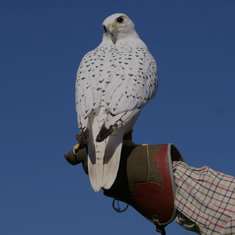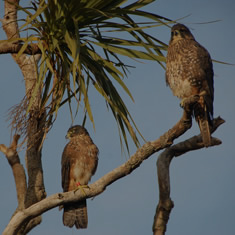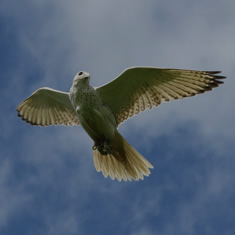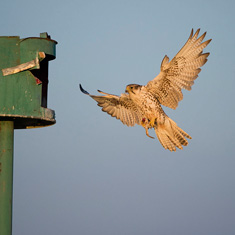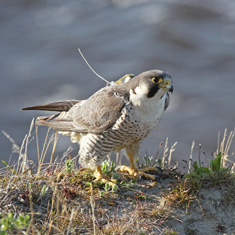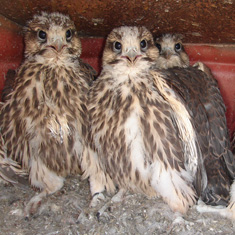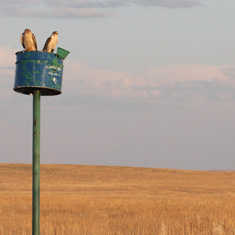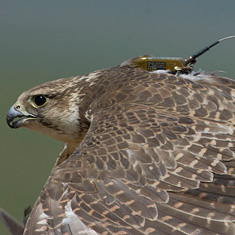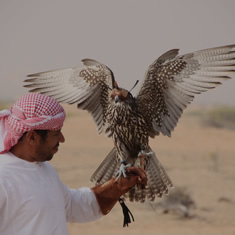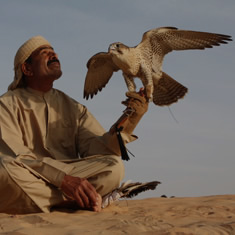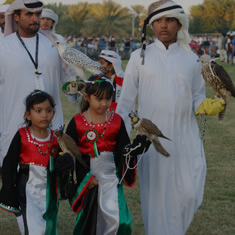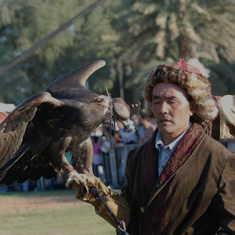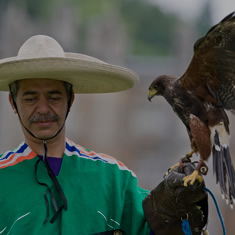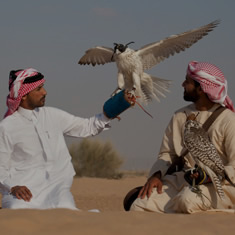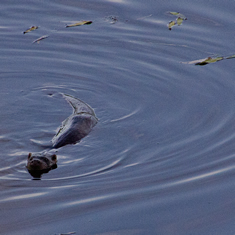- CITES and International Trade
Does your falcon have a passport ?
Lower there is an extract "Does Your Falcon Have a Passport ?"
reproduced from TRAFFIC Bulletin Vol.20, No.3,
p.95. http://www.traffic.org/publications/TRAFFICBulletin_20(3)_Dec05.pdf
N E W S - TRAFFIC Bulletin Vol. 20 No. 3 (2005) 95
FALCONS are culturally important birds in the Middle East. The Bedouin people of the past used falcons to hunt game; today, although it is no longer used of necessity, the falcon is still an integral part of Arab lifestyle and tradition. The Arabian Peninsula is one of the last places in the world where falconry remains a widespread traditional sporting activity.
The sport of falconry is a very old one; the Arabs have practised it from very early times and possibly as long ago as the eighth century BC. The Arabian Gulf States and Saudi Arabia have one of the world’s longest traditions of falconry. The practice of trapping passage falcons has existed for centuries and has proved sustainable until recent years. Recently, falcon populations have declined due to a variety of causes, including overtrapping.
Because certain falcon species are getting increasingly rare in the wild, illegal and uncontrolled trade in those species has heightened and become more profitable. More and more smugglers target the Saker Falcon Falco cherrug (CITES II), Gyr Falcon Falco rusticolus and Peregrine Falcon Falco peregrinus (both CITES I), the most commonly used birds in falconry. The secretive nature of illegal trade makes it very difficult to quantify accurately, but it is safe to say that these are some of the most targeted falcon species for this black-market trade.
In the hope of dramatically reducing illegal trade in falcons, a passport scheme was launched in the United Arab Emirates (UAE) in 2002 in an attempt to regulate falconry and falcon trade so that it complies with CITES requirements and to ensure legal trade regulations are in place. In order to qualify for a passport, all birds must be registered in the UAE. The birds must be legally obtained/imported into the UAE and accompanied by all necessary permits, especially CITES documents, in order to qualify for a passport.
The UAE CITES Management Authorities are responsible for registering the falcons and issuing the passports. Once registration has taken place, a falcon passport can then be issued for the sole purpose of crossborder movement.
The falcon registration forms are available at the Abu Dhabi Falcon Hospital, which is the only hospital in the UAE entirely dedicated to treating falcons that have been injured or are in poor health. It is the only hospital authorized to issue falcon passports. In Dubai and the Northern Emirates, the passports are issued directly by the Ministry of Agriculture & Fisheries (the CITES Management Authority for Dubai and Northern Emirates).
The registration form must include the contact details of the owner, specify the sex and breed of the bird, the country of origin, and whether it is captive bred or wild; the CITES Appendix the bird is listed under and the relevant CITES documents are also required. The falcon owner must present the live bird, the expired passport (if not registering for the first time) and the required Dhs.100 (USD27) registration fee during registration. After the registration process is complete, the passport is issued with the aforementioned information, registration and expiry dates, the place of registration and the CITES listing of the bird; a government ring and a Passive Induced Transponder (PIT) are also issued.
Each passport is given an expiry date which is three years after registration. The falcons will then need to be re-registered and a new passport issued to maintain the bird’s legal status. Currently, the falcon passport is accepted only by a limited number of countries. It is up to each country (whether a CITES Party or non-Party) to decide if it will accept the falcon passport or require the standard CITES permits only. It is hoped that more countries will accept this system in time. As with most legal systems, the falcon passport system is a process that is in need of regular review and revision. It will need to be updated periodically to maintain its integrity within the international arena as well as to remain focused on the legal regulations of the falcon trade. The intention of the falcon passport is to provide a legal structure that complies with CITES, but at the same time is easy to use and provides falconers with a lawful way to participate in the traditional sport of falconry.
Lisa S.Perry
Program Development Co-ordinator
WWF-UAE project office
E-mail: Lperry@wwfuae.ae
N E W S - TRAFFIC Bulletin Vol. 20 No. 3 (2005) 95
FALCONS are culturally important birds in the Middle East. The Bedouin people of the past used falcons to hunt game; today, although it is no longer used of necessity, the falcon is still an integral part of Arab lifestyle and tradition. The Arabian Peninsula is one of the last places in the world where falconry remains a widespread traditional sporting activity.
The sport of falconry is a very old one; the Arabs have practised it from very early times and possibly as long ago as the eighth century BC. The Arabian Gulf States and Saudi Arabia have one of the world’s longest traditions of falconry. The practice of trapping passage falcons has existed for centuries and has proved sustainable until recent years. Recently, falcon populations have declined due to a variety of causes, including overtrapping.
Because certain falcon species are getting increasingly rare in the wild, illegal and uncontrolled trade in those species has heightened and become more profitable. More and more smugglers target the Saker Falcon Falco cherrug (CITES II), Gyr Falcon Falco rusticolus and Peregrine Falcon Falco peregrinus (both CITES I), the most commonly used birds in falconry. The secretive nature of illegal trade makes it very difficult to quantify accurately, but it is safe to say that these are some of the most targeted falcon species for this black-market trade.
In the hope of dramatically reducing illegal trade in falcons, a passport scheme was launched in the United Arab Emirates (UAE) in 2002 in an attempt to regulate falconry and falcon trade so that it complies with CITES requirements and to ensure legal trade regulations are in place. In order to qualify for a passport, all birds must be registered in the UAE. The birds must be legally obtained/imported into the UAE and accompanied by all necessary permits, especially CITES documents, in order to qualify for a passport.
The UAE CITES Management Authorities are responsible for registering the falcons and issuing the passports. Once registration has taken place, a falcon passport can then be issued for the sole purpose of crossborder movement.
The falcon registration forms are available at the Abu Dhabi Falcon Hospital, which is the only hospital in the UAE entirely dedicated to treating falcons that have been injured or are in poor health. It is the only hospital authorized to issue falcon passports. In Dubai and the Northern Emirates, the passports are issued directly by the Ministry of Agriculture & Fisheries (the CITES Management Authority for Dubai and Northern Emirates).
The registration form must include the contact details of the owner, specify the sex and breed of the bird, the country of origin, and whether it is captive bred or wild; the CITES Appendix the bird is listed under and the relevant CITES documents are also required. The falcon owner must present the live bird, the expired passport (if not registering for the first time) and the required Dhs.100 (USD27) registration fee during registration. After the registration process is complete, the passport is issued with the aforementioned information, registration and expiry dates, the place of registration and the CITES listing of the bird; a government ring and a Passive Induced Transponder (PIT) are also issued.
Each passport is given an expiry date which is three years after registration. The falcons will then need to be re-registered and a new passport issued to maintain the bird’s legal status. Currently, the falcon passport is accepted only by a limited number of countries. It is up to each country (whether a CITES Party or non-Party) to decide if it will accept the falcon passport or require the standard CITES permits only. It is hoped that more countries will accept this system in time. As with most legal systems, the falcon passport system is a process that is in need of regular review and revision. It will need to be updated periodically to maintain its integrity within the international arena as well as to remain focused on the legal regulations of the falcon trade. The intention of the falcon passport is to provide a legal structure that complies with CITES, but at the same time is easy to use and provides falconers with a lawful way to participate in the traditional sport of falconry.
Lisa S.Perry
Program Development Co-ordinator
WWF-UAE project office
E-mail: Lperry@wwfuae.ae
Conservation and Research
- Raptor Conservation
- The Peregrine Falcon
- Mauritius Kestrel
- Red Kite Conservation
- New Zealand Falcon Conservation Project
- Migration and Movements of Saker Falcons
- Falcon Genome Project
- Electrocution of Birds of Prey
The Saker Falcon
- The Saker Falcon
- Description
- Taxonomy
- Breeding Distribution
- Breeding Population Estimates
- Wintering Distribution
- Habitat
- Hunting and Diet
- Breeding and Biology
- Migration
- Conservation Status
- Conservation Threats
- Sustainable Harvest
- Conservation overview (HH Sheikh Zayed)
- Captive breeding & research
- Bibliography
- Satellite Tracking
- Reintroduction in Bulgaria
- Reintroduction in Bulgaria
- Mongolian Artificial Nest Project Information
- Mongolian Artificial Nest Project Articles

